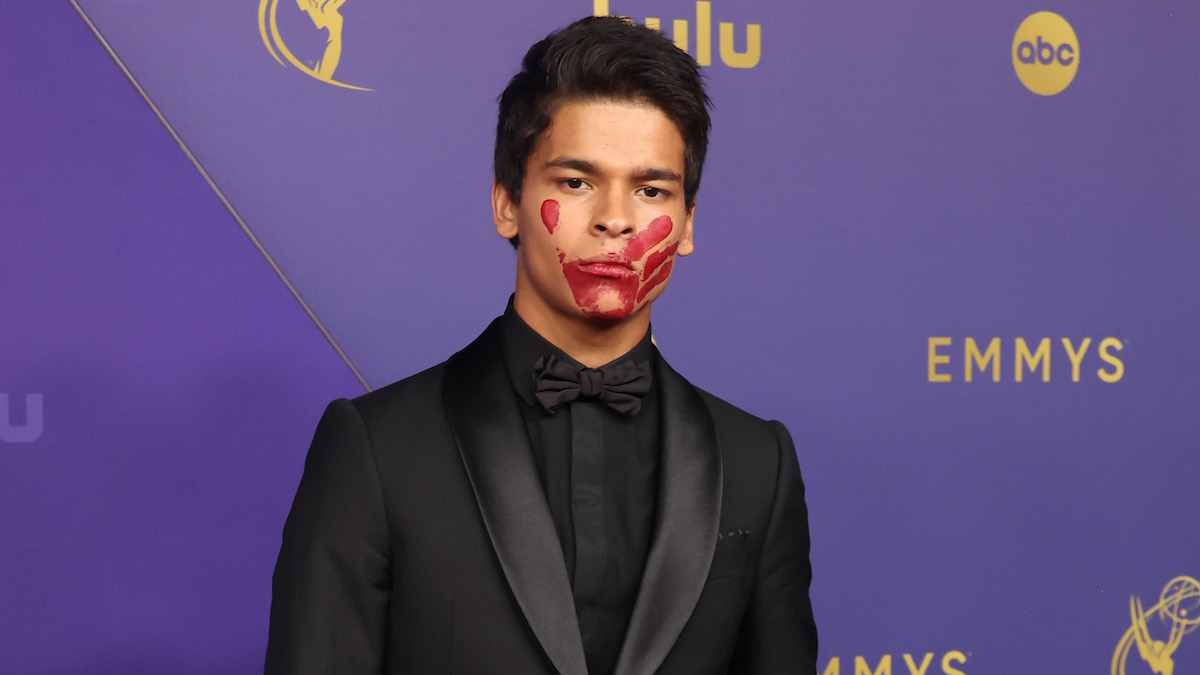‘The red represents violence and death’: ‘Reservation Dogs’ star D’Pharaoh Woon-A-Tai used his Emmys platform to send a powerful silent message

Reservation Dogs star and Emmy nominee D’Pharaoh Woon-A-Tai made a powerful statement on the red carpet of the 2024 Emmys. Without having to utter a single word, the striking red handprint over Woon-A-Tai’s mouth spread awareness of a dire, tragic issue plaguing Native women and girls across the USA and Canada.
Woon-A-Tai was nominated for Outstanding Lead Actor in a Comedy Series for his recurring role as Bear in Reservation Dogs. He used his platform at the high-profile event to bring awareness to a horrifying trend which has historically gone wildly underreported: In the US and Canada, Native women and girls are kidnapped, murdered, and sexually harassed at rates far exceeding either nation’s national averages.
The severity of the problem is so great, and the ignorance about the issue outside Native communities so high, it’s been called a “silent epidemic.”
The MMIW movement, explained
A red handprint over the mouth is the symbol of the Missing and Murdered Indigenous Women (MMIW) movement. The symbol comes from the organization Native Hope and specifically represents the silence of the media and law enforcement in the face this epidemic facing Native communities. Additionally, as Native Hope writes, “it stands for the oppression and subjugation of Native women who are now rising up to say #NoMoreStolenSisters.”
“This is what the red palm print represents—shutting a woman up. The red represents violence and death,” Woon-A-Tai explained in a red carpet interview with GoldDerby.com.
The National Indigenous Resource Center reports the murder rate of Native women is “more than 10 times the national average.” Native Hope additionally points out that murder is the third leading cause of death for Native women. The United States in particular has done next to nothing to recognize or address the issue.
The severity of the issue goes far beyond the fact that the media is widely ignoring these cases. Horrifically, the federal government is drastically underreporting these cases. According to the National Crime Information Center, “in 2016, there were 5,712 reports of missing American Indian and Alaska Native women and girls, though the US Department of Justice’s federal missing person database, NamUS, only logged 116 cases.” That’s just 2% of the reported total, in one year alone.
Add that to the fact that, in the words of the National Indigenous Women’s Center in the same year 2016, “there are approximately 40,000 unidentified human remains either in the offices of the nation’s medical examiners and coroners or that were buried or cremated before being identified.” The picture which emerges is truly horrifying—and deeply, deeply heartbreaking.
No more silence
D’Pharaoh Woon-A-Tai’s bold statement on the Red Carpet of the 2024 Emmys opened the eyes of many to a horrific trend they knew nothing about. I feel deeply grateful to Woon-A-Tai for bringing this discussion into the mainstream limelight. Of course, it should be the responsibility of journalists to represent all people, especially vulnerable populations. It’s eerie how many stories get pushed down before they even get the chance to be considered.
This is the nature of oppressive systems, especially ones playing on racism: They’re so normalized that more privileged populations don’t know they’re there until someone takes a stand. Grassroots organizations do the essential work, but our worship of celebrity culture is such that so often, a celebrity statement is what it takes to get real attention on a subject.
If you didn’t know about this “silent epidemic,” please take Woon-A-Tai’s invitation to read up. Organizations like Native Hope, the National Indigenous Women’s Resource Center, and IllumiNative have fantastic resources for beginners.
Native Hope draws attention to the Not Invisible Act, a proposed federal bill which would create an advisory committee which would make recommendations to the Department of Interior and Department of Justice on how to address this epidemic of missing and murdered women. It would also create a new position in the Bureau of Indian Affairs to aid in coordinating a method to prevent this from happening in the first place.
What with Shogun‘s record-breaking amount of wins, the 2024 Primetime Emmys were historic for many reasons. Here’s to hoping that D’Pharaoh Woon-A-Tai’s act helps create a larger wave for the movement to protect Native women.
All three seasons of Reservation Dogs are available to stream on Hulu.
Have a tip we should know? [email protected]
